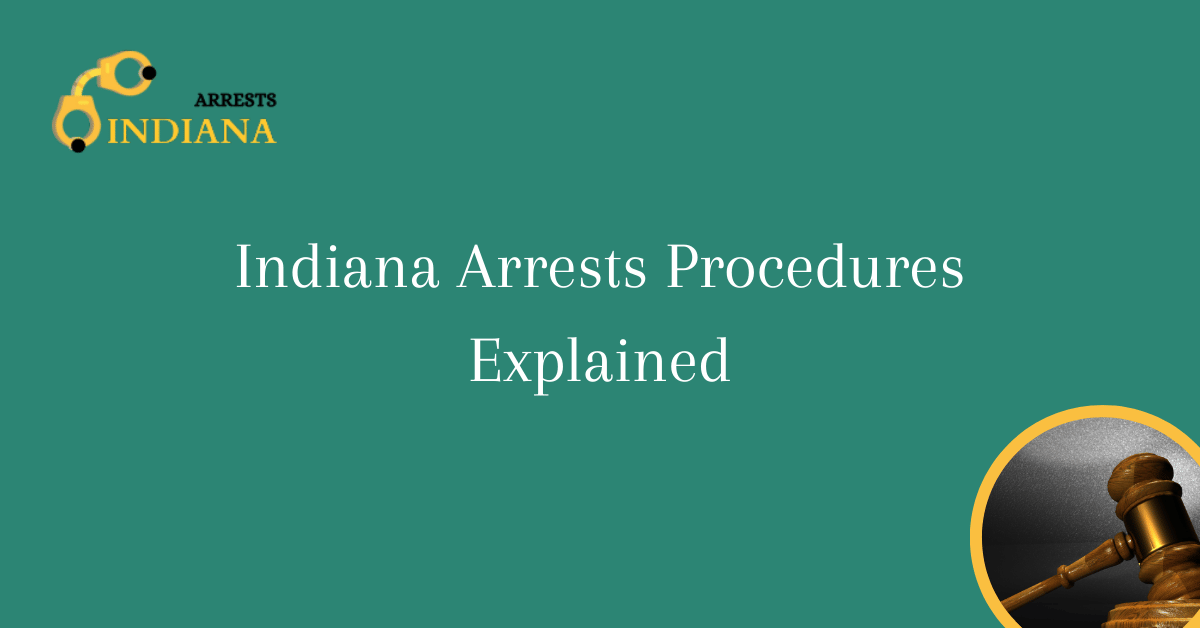Indiana Arrests Procedures Explained
Understanding the process of arrests in Indiana is crucial for both residents and visitors. When a person is arrested in Indiana, law enforcement officers must follow specific procedures outlined by the state’s laws. These procedures include informing the individual of their rights, conducting a thorough search, and documenting the arrest. By having a clear understanding of Indiana’s arrest procedures, individuals can ensure their rights are protected during any law enforcement encounters.
Additionally, understanding Indiana’s arrest procedures can help individuals navigate the legal system more effectively. From the moment of arrest to potential court appearances, knowing what to expect can alleviate stress and confusion. By familiarizing themselves with Indiana’s arrest procedures, individuals can empower themselves with knowledge and advocate for their rights in any legal situation.
Importance of Understanding Indiana Arrest Procedures
Understanding Indiana arrest procedures is crucial for protecting individual rights and ensuring a fair legal process. By knowing the protocols followed during an arrest, individuals can navigate the legal system effectively and advocate for their rights. Knowledge of arrest procedures empowers individuals to make informed decisions and seek legal assistance when needed.
Protecting Individual Rights During Arrest
During an arrest in Indiana, individuals have certain rights that must be upheld by law enforcement officers. These rights include the right to remain silent, the right to legal representation, and protection against unlawful search and seizure. Understanding these rights is essential for safeguarding individual liberties and ensuring a fair arrest process.
Navigating the Legal System Effectively
Knowing the procedures followed during an arrest can help individuals navigate the legal system with confidence. From understanding the arrest warrant process to knowing how to request a lawyer, being informed about Indiana arrest procedures is essential for a smooth legal experience. By knowing their rights and responsibilities, individuals can effectively participate in their legal proceedings.
Empowering Individuals with Knowledge
Empowering individuals with knowledge about Indiana arrest procedures is key to ensuring a just legal system. By educating the public about their rights and the steps involved in an arrest, individuals can make informed decisions and protect themselves from potential abuses of power. Knowledge is power, and understanding arrest procedures is essential for upholding individual rights.
Specific Procedures Followed During an Arrest
When an individual is arrested in Indiana, certain procedures must be followed to uphold their rights and ensure a fair legal process. From informing individuals of their rights to documenting the arrest process, each step is crucial for maintaining transparency and accountability.
Informing Individuals of Their Rights
One of the first steps in an Indiana arrest is informing individuals of their rights, such as the right to remain silent and the right to legal counsel. This is essential for ensuring that individuals are aware of their legal protections and can make informed decisions during the arrest process.
Conducting a Thorough Search
During an arrest, law enforcement officers may conduct a thorough search of the individual and their belongings. This search must be conducted according to protocol and with respect for the individual’s rights. Understanding the procedures for search and seizure can help individuals protect their privacy and property during an arrest.
Documenting the Arrest Process
Documentation of the arrest process is essential for maintaining a record of events and ensuring accountability. Law enforcement officers must accurately document the details of the arrest, including the reason for the arrest, the individuals involved, and any evidence collected. This documentation is crucial for a fair legal process and for protecting individual rights.
Role of Law Enforcement Officers in Indiana Arrests
Law enforcement officers play a critical role in ensuring that Indiana arrest procedures are followed correctly and that individual rights are upheld. By enforcing state laws and upholding due process, officers can maintain public safety while respecting the rights of individuals.
Ensuring Compliance with State Laws
Law enforcement officers in Indiana are responsible for ensuring compliance with state laws during arrests. This includes following protocols for arrest procedures, conducting searches within legal boundaries, and respecting the rights of individuals. By upholding state laws, officers can maintain the integrity of the legal system and protect individual liberties.
Upholding Individual Rights and Due Process
Upholding individual rights and due process is a fundamental duty of law enforcement officers during arrests. By respecting the rights of individuals, including the right to legal representation and protection against unlawful search and seizure, officers can ensure a fair and just arrest process. Upholding due process is essential for protecting the rights of all individuals involved in the legal system.
Frequently Asked Questions
Our FAQ section aims to provide detailed information on Indiana Arrest Procedures to enhance your understanding of the topic.
What are the steps involved in an Indiana arrest?
When a person is arrested in Indiana, the police must inform them of their rights, such as the right to remain silent and the right to an attorney. The individual will be taken to the police station for booking, where their personal information will be recorded. They may be held in custody until they can appear before a judge for an initial hearing.
Can I be arrested without a warrant in Indiana?
Yes, in Indiana, a police officer can make an arrest without a warrant if they have probable cause to believe that a crime has been committed. However, there are certain limitations to warrantless arrests, and the officer must justify their actions in court.
What happens after an arrest in Indiana?
After an arrest in Indiana, the individual will go through the booking process, where their fingerprints and photographs will be taken. They will then have the opportunity to post bail or remain in custody until their court date. It is essential to understand the legal procedures and seek legal advice to navigate the process effectively.
How long can the police hold me in custody after an arrest?
In Indiana, the police can hold a person in custody for a reasonable amount of time to complete the booking process and arrange for a court appearance. If the individual is not released on bail, they must be brought before a judge within 48 hours of the arrest to determine the next steps in their case.
What are my rights during an arrest in Indiana?
During an arrest in Indiana, you have the right to remain silent, the right to an attorney, and the right to a fair trial. It is crucial to exercise these rights and seek legal representation to protect your interests and ensure a just legal process.







